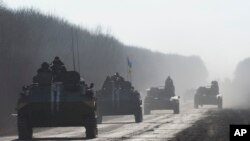Calling Russia’s actions in Ukraine “illegal,” British Prime Minister David Cameron said to lawmakers Monday that more sanctions should be imposed on Russia, if pro-Russian rebels in Ukraine attempt to expand their territorial control.
“Russia must be in no doubt that any attempts by the separatists to expand their territory - whether towards Mariupol or elsewhere - will be met with further significant EU and U.S. sanctions. Russia must change course now or the economic pain it endures will only increase. In the coming days I will be speaking to fellow G7 leaders to agree how we can together ensure that the Minsk agreements do indeed bring an end to this crisis," said Cameron.
Cameron accused Russia of enabling separatists to breach the fragile cease-fire agreements.
“Far from changing course, Russia's totally unjustifiable and illegal actions in eastern Ukraine have reached a new level with the separatists' blatant breach of the ceasefire to take control of Debaltseve, made possible only with the supply of Russian fighters and equipment on a very large scale," he said.
Cameron joined voices with French President Francois Hollande and German Chancellor Angela Merkel, who warned Friday that sanctions could be imposed on Russia if the Minsk agreements to stabilize Ukraine were not fully implemented and the cease-fire was not observed.
Meanwhile, Russia's President Vladimir Putin said Monday that war with Ukraine was unlikely.
In an interview with TV channel Rossiya 1, Putin said he hoped “such an apocalyptic scenario... will never happen.”
He also said he did not think another meeting with France, Germany and Ukraine on resolving of the conflict in eastern Ukraine was needed.
Ukraine's claim that members of the Russian administration were behind bloodshed in Kyiv, he said, are “nonsense.”
Pro-Russian rebels in eastern Ukraine celebrated their victory over Ukrainian forces at Debaltseve Monday with parades and a huge rally in the nearby city of Donetsk. The festivities in the Russian-speaking city came as the Kyiv government asked the United Nations Security Council to deploy peacekeepers to the war-torn region.
The Donetsk rally marked a national holiday in Russia and several former Soviet republics known as Defenders of the Fatherland Day. Reports elsewhere in the region included photos of the newly installed prime minister of Crimea Sergei Aksyonov waving an AK-47 automatic rifle in the city of Simferopol, and a smiling child poised in salute aboard a Russian warship in the Crimean port of Sevastopol.
Weapons withdrawal
Ukraine's military said it cannot begin withdrawing heavy weapons from the frontlines in the country's east in accordance with a cease-fire deal, because pro-Russian rebels are still carrying out attacks.
Officials said Monday there can be no talk of withdrawing weapons as long as the attacks continue.
Germany voiced concern Monday that a "comprehensive" truce had not yet taken hold in eastern Ukraine and urged Moscow to exert influence on pro-Russian separatists to stop the fighting.
German government spokesman Steffen Seibert said, “When you look at the situation as a whole since leaders met in Minsk, it is clear the implementation of the measures is not satisfactory.
"It is worrying for the German government" that a cease-fire has not occurred yet, Seibert told Reuters, adding that a truce is a prerequisite for the withdrawal of heavy weapons and a condition for monitoring by the Organization for Security and Cooperation in Europe.
Kyiv also said it appears pro-Russian rebels are massing near Mariupol for a possible assault on the port.
Agreement reached
On Sunday, both sides agreed to withdraw their heavy weapons from the frontlines. The move was seen as a positive sign for the implementation of a peace plan that has been violated repeatedly.
Military officials said the rebels agreed to complete the withdrawal over the next two weeks, with media reports saying their pullback could begin on Sunday, February 22.
The weapons withdrawal is required under a cease-fire deal that came into effect more than a week ago.
Sunday's agreement came a day after Ukraine and the rebels carried out a prisoner exchange, the first major sign of progress for an otherwise shaky cease-fire reached on February 12. In the exchange, 139 Ukrainian troops were traded for 52 rebels.
Rebels said the prisoners included some troops captured in the strategic railroad town of Debaltseve, which was overtaken by separatists last week in the worst breach of the OSCE-backed truce.
Kharkiv blast
Also Sunday, two people were killed in a bomb explosion in the Ukrainian-held city of Kharkiv, as government supporters there and elsewhere marked the one-year anniversary of the overthrow of Ukraine's pro-Russian president Viktor Yanukovych.
A third victim of the blast, a 15-year-old boy, died Monday from injuries sustained in the blast.
Police said several suspects were arrested in the bomb attack, with a Ukrainian security aide saying they had received weapons and training in Russia.
In Kyiv, several thousand people, led by President Petro Poroshenko, held a peaceful ceremony in Independence Square to mark the anniversary and to commemorate the deaths a year ago of more than 100 anti-Yanukovych protesters.
Since the ouster of the Yanukovych government, Russia annexed Ukraine's Crimean peninsula and pro-Russia separatist rebels launched a rebellion in Ukraine's east. At least 5,600 people have been killed since fighting erupted 10 months ago.
Russia has been widely accused of supplying rebels with arms, fighters and other supplies. Moscow has repeatedly denied direct involvement.
Some material for this report provided by Reuters, AP and AFP.








